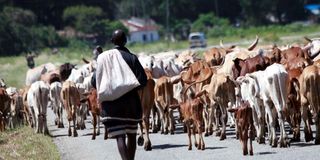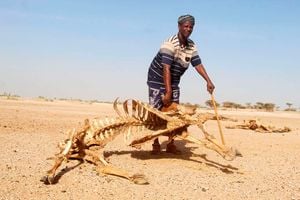
World Bank-backed drought insurance cover has cumulatively paid out $10.57 million (Sh1.37 billion) to Kenyan livestock farmers as bonuses and claims.
World Bank-backed drought insurance cover has cumulatively paid out $10.57 million (Sh1.37 billion) to Kenyan livestock farmers as bonuses and claims, highlighting the growing uptake of the cover that started in November 2022.
Data from regional reinsurer ZEP-RE, which is implementing the first component of the project dubbed De-Risking, Inclusion and Value Enhancement of Pastoral Economies (Drive), shows the uptake of the cover has been growing, supporting 186,903 pastoralists and their dependents by the end of June this year.
The second component of the Drive project, run by the government, is dubbed livestock value chains and trade facilitation. It will, for instance, assist pastoralists to access fodder and help them access markets to sell their livestock and livestock products.
ZEP-RE sells the insurance twice a year—before the start of the short rains and long rains which run from October to December and March to June respectively.
18,000 pastoralists
The uptake, which is now covering 21 counties, is a rise from under 18,000 pastoralists that had been signed up in four counties during the short rains season between October and December 2022 when ZEP-RE rolled out the cover.
The reinsurer, which is also implementing the cover in Somalia, Ethiopia and to Djibouti, says that it has collected premiums valued at $17.67 million (Sh2.28 billion) in Kenya and paid out $5.11 million (Sh660.18 million) as claims to pastoralists spread out in 21 arid and semi-arid counties.
The claims paid out to Kenyan pastoralists is in addition to bonuses of $5.46 million (Sh705.66 million) which is a one-time payment designed to incentivise pastoralists to take up the cover.
The sum assured—the amount of money paid to policyholders or their beneficiaries when a specific risk insured against materialises— stood at $17.67 million (Sh2.28 billion), covering about 1.2 million pastoralists and their dependents.
In Ethiopia, the cover has collected $18.64 million (Sh2.4 billion) as premiums and paid out $7.5 million (Sh969.5 million) in bonuses and claims.
Premiums collected
There have been no claims in Somalia where premiums collected are $15.39 million (Sh1.99 billion). However, bonuses paid out have amounted to $7.07 million (Sh914.6 million).
In total, the cover has netted $51.7 million (Sh6.68 billion), taking over risks worth $254.12 million (Sh32.84 million) in Kenya, Somalia and Ethiopia.
The claims paid out in the three markets amount to $6.42 million (Sh829.9 million) while bonuses have amounted to $18.72 million (Sh2.42 billion), with over 473,000 pastoralists buying the cover.
The five-year project seeks to strengthen support for pastoralists through access to rapid cash when there is drought—either through their savings or insurance payouts, allowing them to keep their core breeding stock alive.
The project incentivizes pastoralists to save more in cash as opposed to increasing the size of their herd at a time when the frequency and severity of drought have increased. The government subsidises the cove subject to a maximum of five tropical livestock units, which is equivalent to five cows, 50 sheep, 50 goats or 3.5 camels but allows farmers to insure more at full cost.
ZEP-RE is now in talks with the World Bank to expand the cover to Uganda, Tanzania and South Sudan and then further to the Sahel region which comprises about 10 countries including Nigeria and Senegal.









